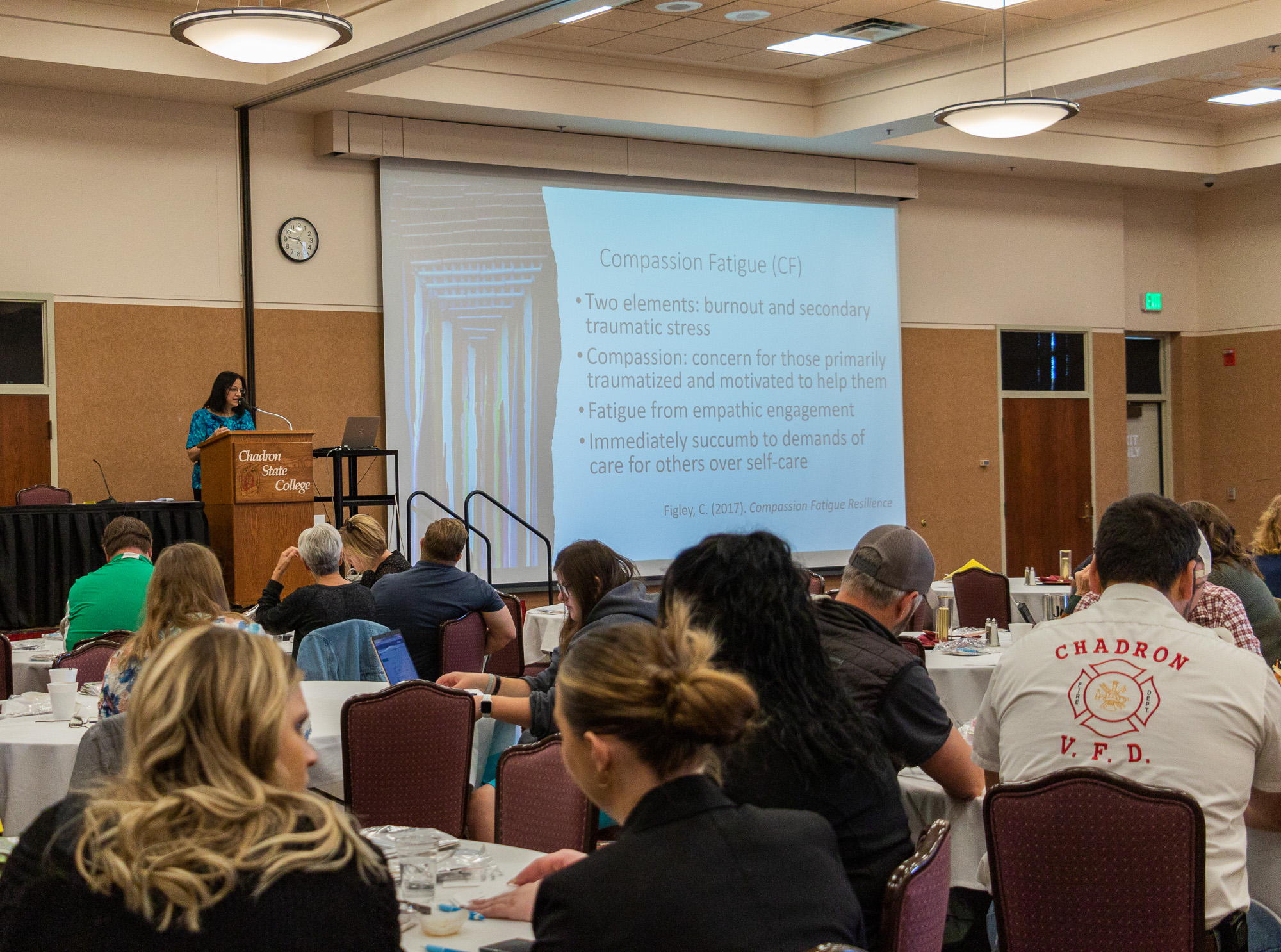Social Work conference speakers offer advice for dealing with trauma

CHADRON – During a conference organized by Chadron State College Social Work seniors, nationally known author and keynote speaker Barbara Rubel spoke about ways for social workers, first responders, law enforcement officers, counselors, and healthcare workers to productively deal with the effects of trauma.
The day-long conference also included comments by representatives of CSC and the community of Chadron including Assistant Professor Dr. Elizabeth Kraatz, Graduate Assistant Amy Carnahan, and Chadron Volunteer Fire Department Chief Branden Martens.
Rubel, an expert in death, dying, and bereavement, said she was in the hospital in 1986 giving birth to triplets when her father, a police officer, died by suicide.
“We take what happens to us and we do something with it. Often we make it our career,” she said.
Rubel led attendees in the Student Center and those watching the live stream through a framework for wellness and fostering resilience. She discussed specific practices that can prevent those in the helping professions from being negatively impacted by vicarious trauma.
“What is your greatest strength that is going to help you mitigate burnout? Focus on your innate abilities that are going to keep you healthy. Find meaning in your work. Maintain personal boundaries and a sense of gratitude,” Rubel said.
Rubel, Carnahan, and Martens all mentioned the importance of peer-to-peer debriefing for first responders.
“I’ve seen a change in the past three years, where debriefing is now the gold standard, it’s a normal process, it reduces stigma, and improves relationships. First responders are 10 times more likely to die by suicide than others. We have an ethical and moral responsibility to care for those who care for us,” Carnahan said.
Rubel said additional self-care for first responders can come in the form of paying attention to the natural environment and nurturing a sense of awe about the beauty in the world.
“Just having a safe place to walk outside can save your life. I’ve heard it over and over. Folks who were going to quit or die by suicide went for a walk instead,” Rubel said.
Rubel emphasized the importance of personal wellness such as exercise and annual health screenings. She asked attendees to reflect on their compassion satisfaction level when they are serving others in their time of need. She also advised spending some time each day having fun, giggling, and being silly.
“Remember the importance of having a sense of humor. Laughter can help you deal with secondary empathic distress,” Rubel said.
In her remarks, Kraatz said medically accurate sex education can help young people know what constitutes a healthy relationship.
“We want to foster strong self-efficacy which is confidence in one’s ability to refuse a sexual advance, negotiate the use of condoms and avoid risky situations,” Kraatz said. “We want to support students in their healing if they have experienced childhood sexual trauma.”
Martens acknowledged that each of the 50 members of his department reacts differently to an event.
He said when the department responded to a fatal plane crash and a train derailment within minutes of each other it was common knowledge they would have a debriefing. For less traumatic events, if even one volunteer who responded to a call asks for a debriefing, he brings everyone from that particular call together for a debriefing.
“When people call 911, it’s their worst day. They are calling 911 for a team, so we have to be a team,” Martens said.
Carnahan, whose cousin, Kyle, died by suicide at age 19, showed a short film about the frequency of Post Traumatic Stress Disorder in first responders and discussed her experiences and observations as a graduate student in counseling.
“These wellness steps are important because you can’t pour from an empty cup. We say each person doesn’t have to carry the load alone. Take the stones out of your backpack and let us carry that weight as a group,” Carnahan said.
Category: Campus News, Student Awards & Achievements
